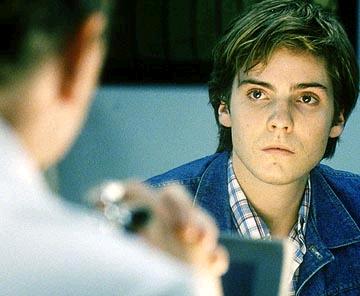

Germany's submission for this year's Academy Awards (which didn't make the cut) was the feel-good Good Bye, Lenin!, which has been blazing its way across Europe, dominating such film festivals as the European Film Awards and the German Film Awards. It's easy to see the appeal that this film had, especially in Europe. The basic plot of this film is a son trying to keep his mother alive by hiding the fact that Germany reunited while his mother was in a coma. This setup serves for a comedy that approaches farce as the son goes to ever-increasing lengths to keep the truth from his mother. On a deeper level, it is about trying to adjust to a new way of life, and remembering a time when things were better. For Europeans, this was in issue in 1989 when Germany reunited, and is an issue today with the birth of the European Union and plans for an expansion. Europeans are dealing with many of the issues touched upon in Good Bye, Lenin! and can easily relate it, especially in the comedic yet poignant style that director Wolfgang Becker uses. Americans have had no recent experience, so the film still remains funny, but some of its deeper meanings require some explanation.
The reason that Alexander (Daniel Bruhl, Vaya Con Dios, No Regrets) is lying to his mother Christiane (Katrin Sass, Heide M., Trial By Fire) is that he is afraid she will have another heart attack. Her condition is serious enough that any sudden shock will cause one. After her husband left the family years ago to defect to the West, Christiane became an ardent supporter of the German Democratic Republic, or East Germany. She fell into a coma after her first heart attack because she saw Alexander being beaten by the police for protesting against the government. In the eight months she slept, her entire world crumbled around her as the Berlin Wall fell, and East Germany awkwardly opened up to capitalism. It's immediately clear that Alexander cares for his mother. He is hiding the truth from her because he and his sister Ariane (Maria Simon, Luther, Portrait of a Married Couple) do not want to lose her.
Christiane is bed-ridden, so Alexander and Ariane need to undo all the changes made to her room in the meantime. It also means hunting for drab clothes and looking for brands of food that are no longer made. Nevertheless, something always goes wrong, and Alexander has to enlist more people in his scheme to help his mother. Neighbors, children, boyfriends, girlfriends and co-workers all get in on the act. This is where the script, by director Wolfgang Becker (Life is All You Get, Child's Play), Hendrik Handloegten (Paul is Dead), Bernd Lichtenberg, and Achim von Borries (Halberstadt, England!) hits its high points, as Alexander goes through an amusing series of near misses. Soon, it's not enough to keep the status quo; Alexander finds that as time passes, he needs to make up more stories. Lies build upon lies, and soon Alexander's fictional East Germany diverges far from the truth.
Here, Good Bye, Lenin! becomes much more bittersweet, and it is this duality of emotion that really makes the film memorable. Alexander didn't like the old regime, but out of his love for his mother, makes up stories about East Germany slowly triumphing. His fake newscasts show the wall coming down, and Alexander explains it by saying that West Germans are flooding into East Germany. Socialism triumphs over the evils of capitalism, and East Germany becomes an idyllic place to live. He puts all his hopes and dreams into this illusion. If he doesn't, he may lose his Christiane. It is funny to see all the crazy explanations that Alexander has, yet profoundly sad to realize why he is doing this. At the same time, he is trying to adjust to the new real world; working with West Germans and constantly crossing the border into a world that is becoming increasingly familiar. In Christiane's fantasy world, people are crossing over the other way.
Bruhl is a great choice for Alexander. He looks like a normal guy, not that much like a movie star. He is somebody that everybody can relate to. Becker has Bruhl use a lot of narration, so the viewer can really get a sense of what is going on inside his head. The beginning of the film is a quick recap of Alexander's life up to this point, and Becker and co. relate Alexander's hopes and dreams as various historical moments pass in his country's history. In a sense, Becker is connecting the lives of Alexander and Germany. As he becomes more successful in hiding the truth from his mother, East Germany becomes more successful. However, at some point, things will come to a head. The other excellent element of Good Bye, Lenin! is much more subtle. Composer Yann Tiersen (Le Poteau Rose) is best known for his whimsical score for Amelie. There are two main themes, a sometimes somber piece that begins with a simple piano, and a more whimsical one centered on an accordion. He provides the music here, and while it sounds a lot like Amelie, it is a good complement to the overall proceedings.